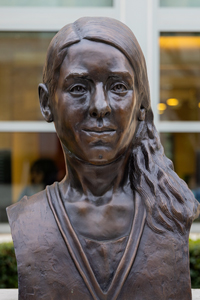"The world has only one border. It is called humanity. The differences between us are small compared to our shared humanity. Put humans first."
- Nadia Murad Basee Taha
Critical Essay by
Dr. Norma Bouchard
Executive Vice President, Provost and Chief Academic Officer
Chapman University
View Bio
Nadia Murad Basee Taha is an Iraqi Yazidi human rights activist and Nobel Peace Prize laureate. Murad was born on June 15, 1993, in Kocho, a small village in the Sinjar District of Northern Iraq. She grew up in a closely-knit Yazidi community as the youngest of eleven children. She had dreams of opening a hair salon.
In August 2014, the militants of the Islamic State of Iraq and Syria, or ISIS, attacked Kocho, killing 600 people. This was part of ISIS’ campaign to eliminate the Yazidi community, an ethno-religious group that combines elements of ancient Mesopotamian origins, Sufi Islam and Christianity. During the attack, Nadia’s mother and six of her brothers lost their lives. With other Yazidi women and girls, Nadia was taken captive and subjected to sexual slavery and violence.
As recounted in her book The Last Girl: My Story of Captivity, and My Fight Against the Islamic State (2017), Nadia was bought and sold many times, tortured, and sexually abused. However, she managed to escape her captor. With the assistance of a Muslim family who put their lives at risk, she was smuggled out of the Islamic State controlled area and arrived in a refugee camp in Duhok, in Kurdistan.
In February 2015, Nadia gave her first testimony to the Belgian newspaper La Libre Belgique using the name of “Basima”. In the same year, she was one of 1,000 women and children accepted into a program for refugees launched by the Government of Baden-Württemberg, Germany.
Nadia became a strong advocate for the Yazidi people and other victims of genocide and sexual violence. On 16 December 2015, she delivered a speech to the United Nations Security Council about human trafficking and conflict and was named the first Goodwill Ambassador for the Dignity of Survivors of Human Trafficking in 2016. In this role, she advocates for refugee and survivor communities and raises awareness of crimes committed against the Yazidi and other communities. In September 2016, Murad also announced the future launching of Nadia's Initiative at an event hosted by Tina Brown in New York City.
Nadia’s Initiative was formally established in 2018. Its focus has been expanded to include de-mining efforts, security, and accountability. Working with the Mine's Advisory Group (MAG), Murad participated in the project of de-mining of more than 2.6 million square meters of land in Sinjar. She also played a crucial role in the drafting and passing of UN Security Council Resolution 2379 which calls for an Investigative Team, headed by a Special Advisor, to document and preserve evidence of crimes against humanity and acts of genocide committed by terrorist groups.
In 2018, Nadia Murad was awarded the Nobel Peace Prize for her efforts to end the use of sexual violence as a weapon of war. Murad donated her prize winnings of $500,000 to support Nadia's Initiative.
In 2019, alongside a delegation of survivors of religious persecution, Murad gave an address to the Ministerial to Advance Religious Freedom where she described the on-going challenges still faced by Yazidis. In 2020, Murad began working with the Institute for International Criminal Investigations (IICI) and the Preventing Sexual Violence in Conflict Initiative (PSVI) of the United Kingdom government to establish the Murad Code. The Code, formally released in 2022, aims to build a community of practice to better support survivors of war-related sexual violence.
On 6 February 2021, the Yazidi community buried 104 victims of the Kocho massacre, including two of Nadia's brothers and in March 2021, the Iraqi Parliament passed the Yazidi Female Survivors Law which acknowledges the Yazidi genocide and the gender-based sexual violence against Yazidi women and other ethnic minorities. In May 2021, the United Nations Investigative Team UNITAD reported that the crimes against the Yazidi people are an example of genocide.
Murad continues to be a tirelessly advocate for the Yazidi people and other victims of genocide. She is a powerful symbol of courage, determination, and the fight for justice.
